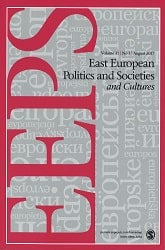Explaining Labor Weakness in Post-Communist Europe: Historical Legacies and Comparative Perspective
Explaining Labor Weakness in Post-Communist Europe: Historical Legacies and Comparative Perspective
Author(s): Stephen CrowleySubject(s): Political history, Labor relations, Government/Political systems, Comparative politics, Post-Communist Transformation, EU-Accession / EU-DEvelopment, Human Resources in Economy
Published by: SAGE Publications Ltd
Keywords: labor unions; trade unions; post-communism; corporatism; strikes; European Union expansion;
Summary/Abstract: With expansion of the European Union (EU), the transformation of industrial relations in Eastern Europe becomes increasingly important. Studies on labor relations in post-communist countries have flourished in recent years, yet these studies have not reached a consensus on what they seek to explain. Is labor in post-communist societies weak or (in some countries) strong? And strong or weak compared to what? To the extent labor is weak, what would explain this weakness? This study demonstrates that labor is indeed a weak social and political actor in post-communist societies, especially when compared to labor in Western Europe. The article examines a number of hypotheses that have been proposed to explain labor’s weakness, concluding that the institutional and ideological legacies of the communist period best explain this overall weakness. Because labor in postcommunist societies more resembles American-style flexibility than the European “social model,” the ability to extend the European model to new EU entrants is questioned.
Journal: East European Politics and Societies
- Issue Year: 18/2004
- Issue No: 03
- Page Range: 394-429
- Page Count: 36
- Language: English
- Content File-PDF

